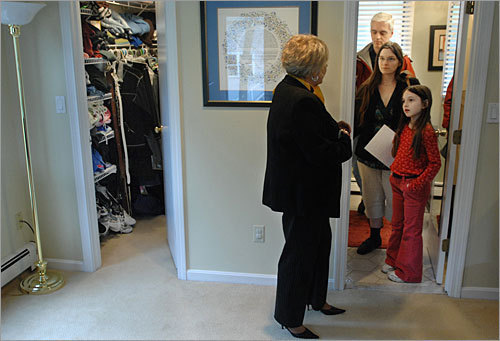If you're buying a home right now, you have plenty of reasons to feel good: Interest rates are low, and housing prices around Boston, while not the mind-boggling bargains you might hope for, are overall considerably lower than they were at their peak in 2005. And while the $8,000 homebuyer tax credit expires Friday, there are lots of good deals to be had.
With the sales season under way, we canvassed local real-estate brokers and housing market specialists for tips and broader home-ownership wisdom
1. Get your financing in order
This bit of advice topped the lists of most of the brokers we talked to. Given tighter lending practices — and that it's a competitive buyers' market — would-be buyers need to have their ducks in a row so that they're ready when they see the right home. "The seller wants to know that if they do accept the offer, that barring catastrophic title issues or inspection issues, the deal is going to go through," said Gary Dwyer, broker-owner of Buyer Agents of Boston. Amy Meller, broker-owner of the Sudbury-based MassHomeSales.com, recommends having a full pre-approval within the past 30 days. "Six months is no good anymore, because the rules keep changing," she says.
2. Understand your time horizon
As a shorter-term buyer, you might consider whether the place is a good investment, and if it's the kind of property that's going to be attractive for the next buyer. "What concerns you now is going to be a concern in a few years," Hillman says. A house near train tracks, for instance, is probably not what most people are looking for. But for someone who's planning to stay longer, a good school system or larger lot size might make up for the trains thundering past — especially, perhaps especially, if the buyer grew up near train tracks and got used to it.
3. Know the overall market conditions
Investigate what comparable properties have sold for over the past three to six months, Dwyer advises. If you're working with a buyer's agent, he or she should know what fair-market value is, not just the list price.
If you're not working with an agent, sites with pricing information such Zillow.com or Trulia.com could help.
4. Search and buy within your means
This bit of advice is always true, but if the housing crisis has taught us anything, it's that buying with the expectation that prices will continuously go up — and that if you can eke out the payments each month, you'll be in a good spot in the long run — isn't such a good idea. "Buyers can start looking too high and have a pie-in-the-sky idea of what they can afford," says Meller. Start looking at properties you can honestly afford, she advises. If you're very lucky, things could change: A parent could decide to help out, for instance. If you buy at the very top of your price range, Meller adds, "it's hard to make it all feel right in the end."
5. If you're waiting for prices to go lower, think again
Real estate is a bit like the stock market, Hillman says, in that it's unpredictable. Though some people might be waiting on the sidelines for housing prices to dip lower, she says, "looking at the numbers, I can't see them continuing to go down." What's more, many market watchers are expecting interest rates to inch up since the Federal Reserve ended its program of buying mortgage-backed securities — which kept interest rates low — at the end of March. (That said, rates are hovering just above 5 percent, still near record lows.)
6. Don't get too sucked in by appearances
Buyers should keep in mind that many sellers will try to present their homes in the best possible light. "If the house has been staged, what [potential buyers] forget is that all that stuff is going out when [the sellers] leave," says Needham realtor Harriet Lieb. "Sometimes you're better off buying something that needs a little decorating, because it's going to take on your own look anyway." Dwyer also recommends looking at the size of the furniture in a home, since it can make a room feel smaller or larger than it really is. Window treatments can sometimes hide an unattractive view or windows that are in desperate need of repair. Music playing can detract from road noise or noise from a neighboring unit.
7. Have questions prepared
Sellers and their agents should be prepared to answer questions including how old the roof, heating system, hot water heater, and windows are; if the basement has taken water in the time the seller has been there, and if there's a sump pump; and what utilities and homeowner insurance generally cost. If there's been recent renovation work, buyers should find out of all building permits have been signed off and if all of the contractors and sub-contractors have been paid in full. If there's a pool, buyers should ask if the seller has a permit from the city or town.
8. If you're thinking of buying a brand new house...
Consider that a home that's been lived in has been tested, says Lieb. The seller will be able to tell you if the basement takes on water in a rainstorm, for instance. "People will pay a lot of money for a brand new house. I tell people, it's only new once. It's like a car — you drive it out of the lot, it's not new," she says.
9. If you're buying a condo, know the rules
Condo lending rules have become more stringent, making it difficult for some would-be buyers to get financing. Lenders generally want buildings to be at least 50 percent owner-occupied, Dwyer says. They don't one want one person to own more than 10 percent of the units, he adds, since that owner could sway how money is spent and, hypothetically, decide against making repairs. (Which, of course, may not bode well for actually living there.) Buyers may also have trouble getting financing for condos in buildings with a certain amount of commercial space.
10. Think about a home's intrinsic value
The downturn in the housing market and the uncertainty about where it's headed may lead people to think less about picking up an incredible bargain in the hopes of making a huge profit and more about the home in its own right. "[Buying a home] has always been a consumption decision and an investment decision," says Nicolas Retsinas, director of the Joint Center for Housing Studies at Harvard. In recent years, "we moved that dot along the continuum, and it became an investment decision." "Questions such as 'Is this where I want to raise a family' and 'Is this close to the things that are important to me' will factor more into the decision," he says.
By Ami Albernaz, Boston Globe April 29, 2010









1 comment:
This is a really good resource - here's something I thought was cool- thought I'd share it with you, it's all about getting your ducks in a row before buying a home: http://www.fischerandfrichtel.com/blog/index.php/2010/02/getting-all-your-ducks-in-a-row-before-buying-your-new-home/
Post a Comment